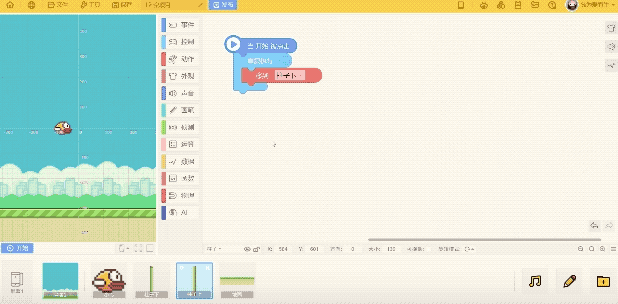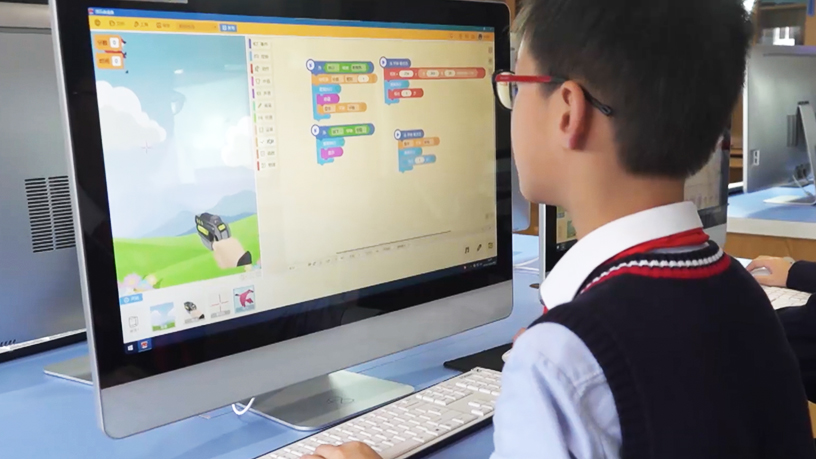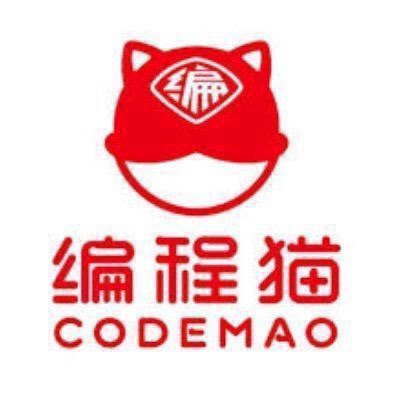In November 2014, two young postgraduate students, both from China, attended the Web Summit in Ireland together. They were in Europe pursuing their masters in Computer Science and were only a few months away from graduation. One of the two, Sun Yue, had already landed a job at a Finland-based institute. The other, Li Tianchi, had applied for a PhD at UC Berkeley.
It was a routine trip to a tech conference until they chanced upon something they had never seen before. “There were kids, aged only seven to eight, coding with great passion,” they recalled. “They coded better than most Chinese college students.”
Li, who has a young brother, immediately felt inspired. Coding education for kids in China was still rudimentary then, barely improved compared with two decades ago. Most schools were only offering computer lessons limited to the use of desktop software like Microsoft Office, while those who did have coding classes were using outdated textbooks. In the private education segment, although there were many well-established players in some provinces, those taught only academic subjects. Private academies that taught coding were few and small.
In the west, on the other hand, coding for kids had become a fast-rising trend. Coding became compulsory for school-age kids in Northern Europe by 2014. In the same year, former US President Barack Obama wrote a line of code himself when he kicked off the Hour of Code event to promote coding education among youth.
Hence Sun and Li sensed an opportunity. In December 2014, months before receiving their degrees, they returned to China and founded Codemao. The pair gathered 100 children from their circle of friends and taught them coding. Today, using the online teaching tools they built, Codemao has taught over 31m Chinese kids how to code.
In November 2019, Codemao closed its Series C round of funding, bringing its total amount of money raised to RMB 1bn. The startup expects to become profitable around the end of this year and go public on the Sci-Tech Innovation Board, China’s new Nasdaq-style stock exchange.
Designed for kids
From the outset, Li and Sun decided to teach kids online using interesting and innovative methods. Learning the basics of coding can be boring for kids, especially for Chinese kids, as most coding languages use English words. Online education is also the only way coding can be taught in rural areas where it is difficult to recruit qualified teachers.
Codemao came up with a whole new online suite of teaching tools – computer software, language and unique code editors, and mobile apps – designed for kids. Upon logging in, each student would be greeted by a cartoon character called Mao Laozu, or Cat Master in English. Mao Laozu plays the role of a friend who guides the kids as they learn to code. They first watch a cartoon about the cat's life, and indirectly learn about coding concepts thanks to content embedded in the video. They then apply that newly gained knowledge during the coding part of the class, each time building more and more complex projects as the level of difficulty increases with time.
Mao Laozu is actually also an AI-based chatbot that can answer questions posed by the children. There is also the option of speaking to a human teacher via live audio or text chat, but only when Mao Laozu can't resolve a query.

Codemao has also created its own coding language, called Kitten. Inspired by Scratch, a visual programming language (VPL) developed by MIT, Codemao's Kitten is similarly VPL-based. Kids learn to code with Kitten by dragging Lego-like visual blocks and manipulating the "codes" on the blocks written in daily spoken Mandarin.
Compared with Scratch, Kitten has simpler functions but it has other advantages. For example, it can run in a mobile app – especially accessible to Chinese kids used to using smartphones. Kids who haven't yet learned to read can use Codemao in a separate app designed for them, and so too can kids who already have a strong command of coding. The startup has created its own coding curriculum as well that can be used by students of all levels.
“After only a few classes, kids would be able to build a game like Plants vs. Zombies,” said Li. The proof is in Codemao’s Github-like community. In just four years, kids have uploaded over 10m works to the platform in many categories, including action and shooting games, art and stories.
For more serious coders, Kitten also offers lessons in Python, a high-level, general-purpose programming language, and the option for Kitten to be translated into Python.
Tailwind and B2B+B2C model
Three years after Li and Sun started Codemao, China is putting more effort into promoting coding education for kids. In 2018, China announced that coding education will eventually be available in all schools. Coding education has also become attractive for investors. The market is estimated to be worth RMB 10bn, with over 200 startups already in the game.
Codemao, the early mover, believes its content, suite of learning tools and community comprise its competitive advantage in a somewhat homogenized market that mostly teaches Scratch, which also runs in Chinese.
With more money in its war chest, Codemao is expanding its offline coding education footprint. Already it has a few partner offline institutions. In June 2019, it announced it was opening 1,000 brick-and-mortar coding schools in 100 cities over the next three years. These would be run by its local partners, who currently offer online learning for kids, but in future there will be teachers in the classroom too. Codemao will also be collaborating with public schools to shape the future design of coding lessons.














